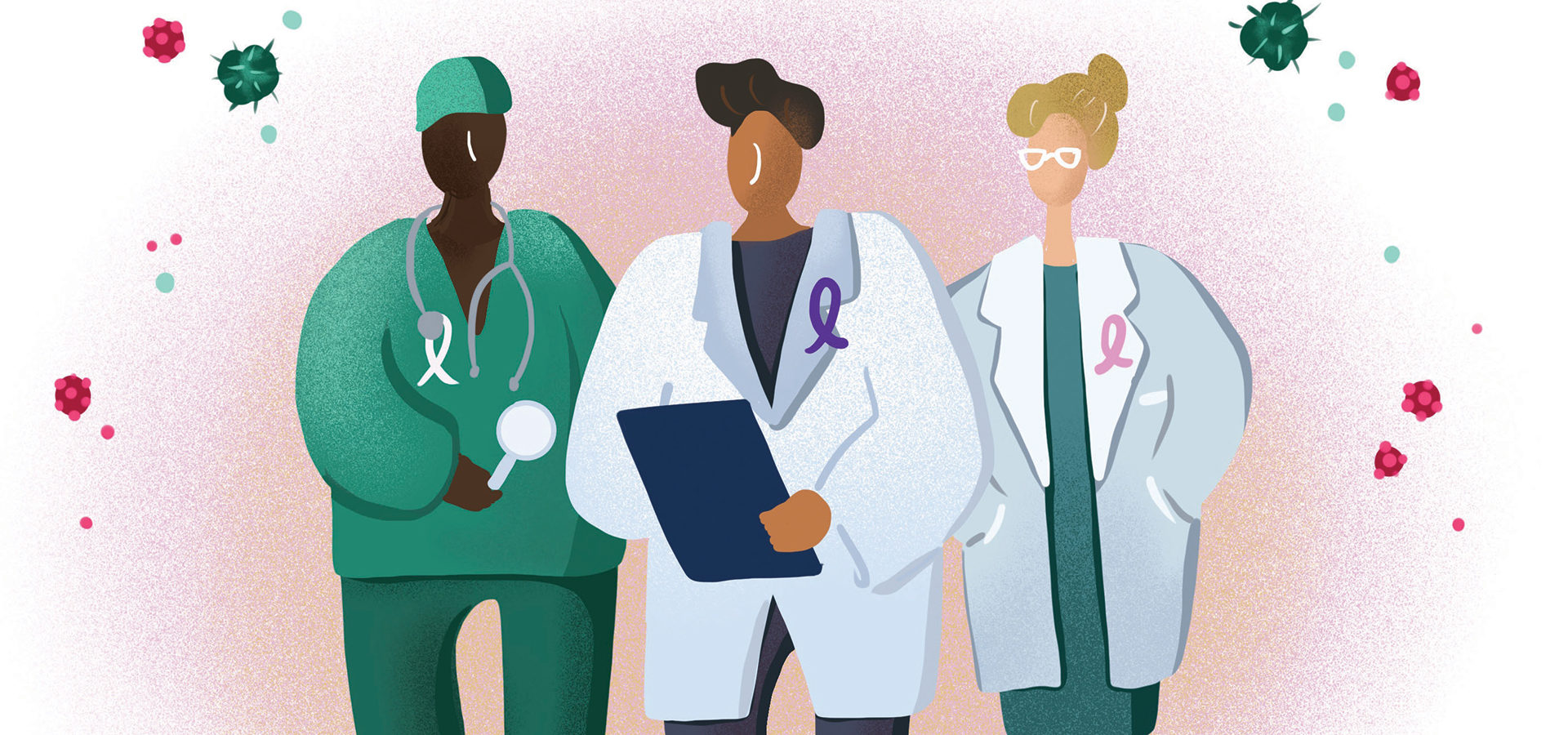
A CSUN Professor & His Students Take on the Big C
It’s about saving lives.
-
CategoryHealth
-
Interviewed byAnne M. Russell
-
Illustrated byYuiko Sugino
California State University Northridge biology professor Jonathan Kelber, Ph.D., has twice won $1.46 million grants from the National Institutes of Health. “Basically, NIH is saying ‘We like what you’re doing,’” Dr. Kelber explains.
What Dr. Kelber is doing in CSUN’s Developmental Oncogene Laboratory is studying the PEAK1 gene, which likely plays a role in facilitating the growth of cancer cells throughout the body as they disperse from the original tumor. For Dr. Kelber and his team of 13 trainees (undergrads, grad students and postdocs), the $3 million question is: How does that occur on a molecular and cellular level, especially in aggressive, hard-to-treat cancers?
The Northridge resident received his undergraduate and master’s degrees at Cal Poly Pomona, and his Ph.D. and post-doctoral experience at UC San Diego. Dr. Kelber won Fulbright scholarships in 2017 and 2019 and has worked as a visiting professor at Harvard Medical School’s Ludwig Center. He is now in his 10th year at CSUN.
Here we talk with the professor about the research he is spearheading, which he views as his chance to coach and mentor the next generation of scientists.
 Why did you focus on the process of metastasis rather than on the origination of cancer?
Why did you focus on the process of metastasis rather than on the origination of cancer?
We are very interested in addressing the issues that cause patient mortality. For solid tumors, what drives patient mortality is the spread of these cancers to distant tissues. Once it has spread, it becomes nearly impossible to treat.
Studying the process of metastasis is, roughly speaking, a catchall for a lot of the same processes that drive the initiation of the cancer.
Your research centers on breast cancer and pancreatic cancer. Why those two?
By studying certain processes within those two cancer types, we’re studying processes that are relevant to a lot of different cancers.
We’re particularly interested in those minority of cases where breast cancer doesn’t respond to therapy or can’t be surgically removed—the more aggressive types of breast cancer. The majority of pancreatic cancers fall into that class—they aren’t responsive to clinical intervention, and they progress very rapidly. Often patients are diagnosed late in the disease progression, so it allows us, within two different cancer types, to study similar processes that ultimately contribute to mortality.
How would your research into the PEAK1 gene translate into a real-world therapy?
Translating basic findings to improving patient outcomes is a long-game process. It’s on the order of 20 years or so.
With regard to the PEAK1 gene and the protein product of that gene, we’re still very early in that translation effort. But we know PEAK1 does have some enzymatic activity. Most reports suggest that when PEAK1 is active in that way, it exacerbates cancer progression. So we could envision developing antagonists that might inhibit or suppress that enzymatic activity.
The second way is understanding what events lie upstream or downstream of PEAK1. What turns on PEAK1 gene expression? What turns on PEAK1 activity? Or when PEAK1 is active, what else gets turned on? Our lab is looking right now at upstream events that we can target to ultimately inhibit the production of PEAK1.
What do you think the future direction of cancer treatment will be—is it DNA editing? Immune therapy?
I think the future will lie in trying to understand the specific needs of patients themselves—delivering personalized or precision therapies. That involves targeted approaches: immune therapy or small-molecule therapy or antibody therapy, along with more traditional chemotherapies that don’t have cancer-specific targets but tend to target cells that are highly proliferative.
We’re getting to the point where we can evaluate what is best for a specific patient almost in real time. With patient biopsies in the laboratory, we can know within a few weeks what that patient’s cancer will respond to. It won’t be a one-size-fits-all approach. It will be: What is best for patient X? What is best for patient Y? And developing a combination approach that is tailored to their disease.
What do you wish that nonscientists understood better about cancer?
There are cancers like cancers of the breast, the skin, and of the lower GI tract that have exceptional screening approaches. For women, that’s mammograms. For all people, colonoscopies. I think they’re underutilized by the general public. These diagnostic measures are really important.
Is it realistic to hope that in the future no one will get cancer?
No. Cancer is generally a disease of aging. Our cells age and certain environmental influences like UV light cause those processes to speed up, and essentially the DNA gets damaged. I suspect we won’t eradicate the incidence of cancer.
But I also think that treating cancers with a more personalized approach may drastically improve outcomes over the next decade or three or four decades. We may, in some cases, be seeing cancers that are completely curable from a post-diagnosis stage through the end of the patient’s lifetime so that they begin dying of other causes. I don’t think we’re going to cure death. But it would be preferable that people have high quality of life in their end stages. Unfortunately, cancer is a really tragic way of dying.
The Building Boom in the Valley for Senior Living Communities Has Escalated
Upscale livin’ for active retirees.











